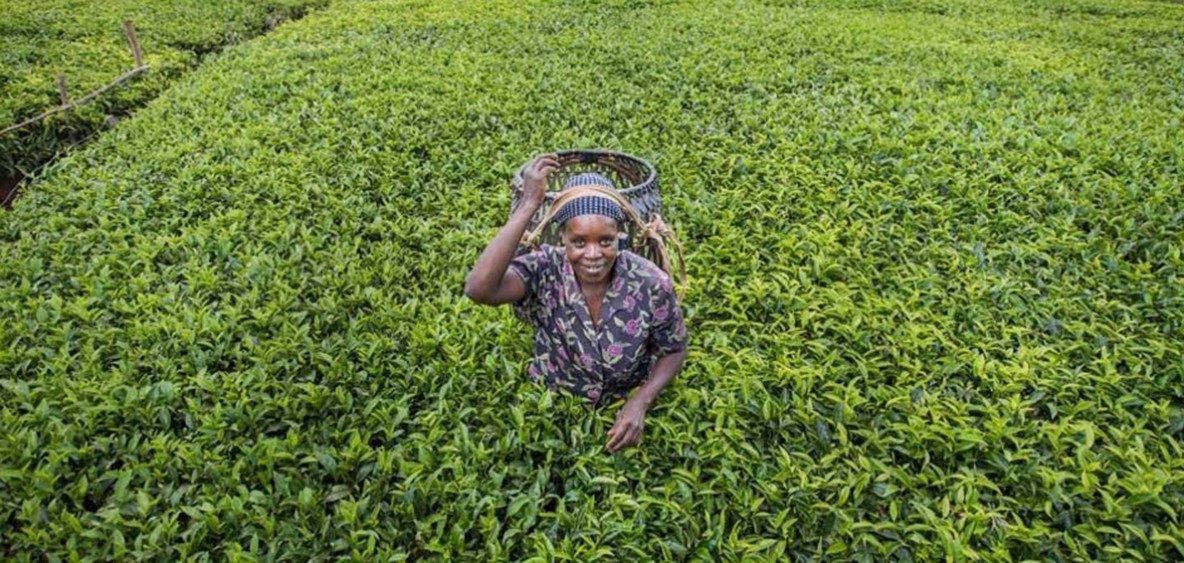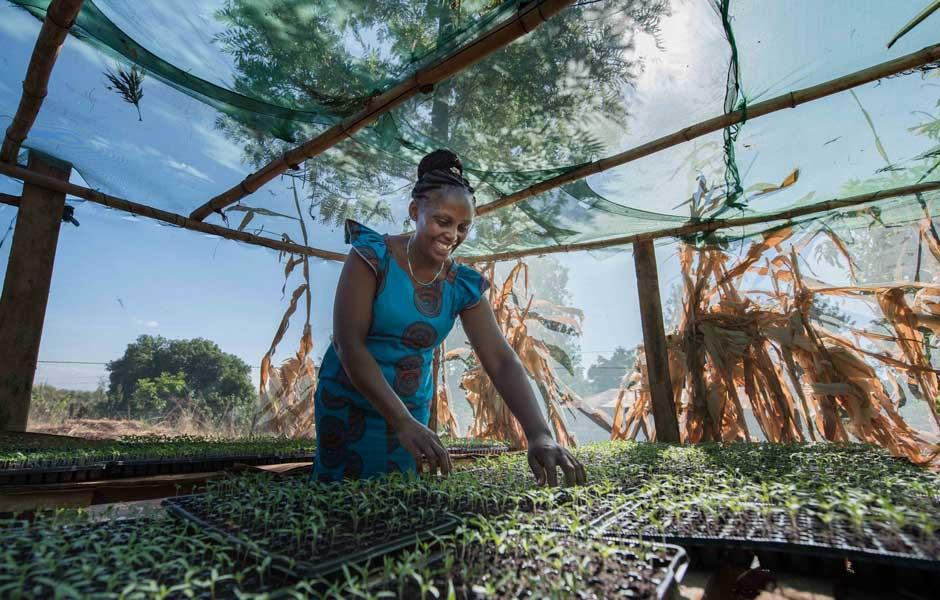 Beatrice Manyua picks up to 30 kg of tea a day on her plantation in Kenya. With support from RFS, she has reduced soil runoff and increased her yield of tea and food. © Roshni Lodhia
Beatrice Manyua picks up to 30 kg of tea a day on her plantation in Kenya. With support from RFS, she has reduced soil runoff and increased her yield of tea and food. © Roshni Lodhia By implementing initiatives that are gender-responsive, RFS country projects are seeing high-impact results for women, communities and sustainable development.
Takhona Mdluli is one of many women farmers who has benefited from the RFS programme in Eswatini.
After receiving intensive training on the rearing of indigenous chickens for consumption and sale, Takhona was able to increase production, connect with new markets and improve her monthly income. The training was essential in facilitating connections with end markets and securing consistent income for her and her family.
“With the new knowledge, I am now able to secure a source of income that has made me become a better individual, as I am now able to maintain my household. What is more exciting is the fact that I have been able to construct a modern house using the earnings that I have received,” said Takhona.
The training sessions have also provided a platform for female farmers to connect with one another, combine knowledge and resources and solve problems collectively.
In sub-Saharan Africa, women account for roughly half of the agricultural labour force, yet their productivity levels are lower than men’s due to unequal access to land, credit, inputs and extension services. Climate change, land degradation and biodiversity loss affect men and women differently. Gender roles and relations translate to imbalances in how decisions are made and resources are distributed within households. Women are often more burdened by water and food shortages, and less likely to benefit restoration and mitigation efforts.
Ultimately, this disparity affects not only women, but the whole household and the larger community, undermining resilience, agricultural productivity, socioeconomic development and food security. IFAD estimates that providing women with the same access to productive resources, skills, tools and technologies as men, could increase production on women’s farms by as much as 30 percent.
In Kenya’s Upper Tana watershed, female-headed households are often more dependent on farming – and therefore water – for income, than male-headed households. The end result is female-headed households struggle with food security. Of the thousands of farming households in the watershed, one in four is headed by women.
The RFS Kenya project, the Upper Tana Nairobi Water Fund (UTNWF), is helping women like Mercy Wangechi, a farmer who grows a variety of tomatoes on land she inherited near the Mt. Kenya forest. As a cross-cutting objective of the RFS programme, UTNWF ensures that women have equal access to the technologies and materials distributed by the project as well as equal participation in training and extension services.
By providing materials and technical support, UTNWF helped Mercy construct and line a 50,000-litre water pan to capture rainwater. As of today, she has increased her income enough to expand her water pan to 100,000 litres.
“Last season I planted a variety of tomatoes, and people were coming from all different locations just to see them,” Mercy said. “With the profits I made, I bought a car, which is helping me take tomatoes directly to market. I’m now a farmer and a businesswoman!”

In line with GEF’s ambition to ensure gender equality and promote women’s empowerment across its operations, RFS contributes toward closing the gender gap in agriculture by integrating gender perspectives and concerns at each level of implementation.
In early 2021, the RFS Regional Hub launched a guidance note on gender-responsive project implementation to assist country teams in identifying activities, methods and approaches to ensure that men and women have equal opportunities to participate in, contribute to and benefit from country project activities.
Gender responsiveness means going beyond the identification of gender-based differences and a “do no harm” approach to making a conscious effort to address gender and social inequalities through project activities, seeking to advance gender equality. This requires thoughtful planning, staffing and resourcing, and involves understanding how anticipated outputs and outcomes will affect women and men differently. It takes into consideration how the different roles and status of women and men will affect the project activities and objectives. It also requires tailoring approaches and methods to the needs, priorities, and interests of women and men of different ages and socio economic and cultural backgrounds. Gender responsiveness should, at its core, facilitate the equitable achievement of project benefits for both men and women.
The guidance note begins with an overview of four key gender dimensions—gender equitable participation in decision-making; access to and control over resources; access to financial services and markets, and control over income and benefits; and equitable workload—and how they relate to RFS thematic areas.
The note provides concrete recommendations for programming and implementation, as well as the types of outcomes that can be achieved when a gender dimension is recognised and addressed. The guide also highlights examples of what RFS countries are doing or are planning to do, at different scales, that could be replicated. Finally, the last section offers a selection of tools, methodologies and resources to support gender-responsive project implementation.
RFS Regional Hub gender specialist, Ana Maria Paez Valencia believes that gender responsiveness should be understood as the minimum standard for inclusive and sustainable project implementation. “Tackling harmful gender norms and unequal relations cannot be considered as accessory to technical interventions,” says Ana Maria. “This work should be viewed as a critical requirement to achieve sustainable outcomes.” Across the programme, the guidelines support the planning, implementation and monitoring activities of all 12 country projects. Whether it’s installing rainwater harvesting technologies or connecting women farmers with new end markets, the programme’s focus on empowering women is accelerating the pace of transformation of rural food systems.
Carol Nguru, an extension agent trained by the RFS Kenya project, believes that targeting women is key to both increasing agricultural productivity and scaling up conservation. The women she works with are eager to learn new skills and adopt new technologies, often encouraged by the support of other women within the community. “What I’ve seen is: If women take the lead, it happens faster.”
Subscribe to our monthly newsletter to receive updates on stories directly from the field across all our projects, upcoming events, new resources, and more.